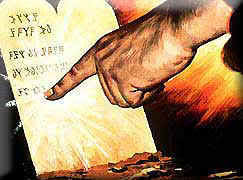The Journey Beyond False Idols
You shall not make for yourself a carved image, or any likeness of anything that is in heaven above, or that is in the earth beneath, or that is in the water under the earth. You shall not bow down to them or serve them… (Exodus 20:4-5a, ESV)
“As Moses was receiving the 10 Commandments from the Lord, the Israelites were actively engaging in idolatry by worshipping a golden calf that they had made by melting the gold they brought out of Egypt. Not all those in the desert had also, at this time, cast off the worship of the Egyptian gods.” “But professor, come on, Christians aren’t worshipping false gods today. If they are, they are part of another religion.” The class broke out in laughter at the humor. “No one is worshipping the Egyptian gods, Roman, Greek, Norse or whoever gods and proclaiming to be a Christian.” “So you believe that Christians have this commandment beat? That they don’t need to worry about it because it doesn’t happen any more today?” the professor countered. “Well, yeah,” the student answered sounding sure of himself. “Anyone disagree?” asked the professor. One student shyly spoke up from the front row. “What about celebrity culture? Isn’t that a form of worship?” she asked, gaining confidence. “People buy products recommended by celebrities. They will vote a certain way because a celebrity tells them too. A lot of people follow along with celebrities regarding how they should act or think about a subject. They will arrange their plans around their favorite show, movie, or a special performance. And what about Christian symbols – a crucifix, a cross, preachers, saints, or even the Pope? Couldn’t some people, perhaps mistakenly, be worshipping these symbols and people?”
 Looking to others for guidance in forming our opinions is not a new concept. We all do it and have done it since we were children. The Israelites also looked to others for guidance. In Egypt and in the desert, they looked to Moses and Aaron, who looked to the Lord. But as Moses was on the mountain receiving instructions from the Lord, the Israelites began to fear that the Lord had abandoned them (Exodus 23:3-6). The Israelites turned from the Lord and insisted that Aaron make them a gold calf in order to worship it. And later, after the Lord had shown them His power and protection, the Israelites looked to other nations, instead of the Lord, for guidance on how their nation should be governed. They wanted a king so they could be like other nations.
Looking to others for guidance in forming our opinions is not a new concept. We all do it and have done it since we were children. The Israelites also looked to others for guidance. In Egypt and in the desert, they looked to Moses and Aaron, who looked to the Lord. But as Moses was on the mountain receiving instructions from the Lord, the Israelites began to fear that the Lord had abandoned them (Exodus 23:3-6). The Israelites turned from the Lord and insisted that Aaron make them a gold calf in order to worship it. And later, after the Lord had shown them His power and protection, the Israelites looked to other nations, instead of the Lord, for guidance on how their nation should be governed. They wanted a king so they could be like other nations.
So Samuel told all the words of the Lord to the people who were asking for a king from him. He said, “These will be the ways of the king who will reign over you: he will take your sons and appoint them to his chariots and to be his horsemen and to run before his chariots. And he will appoint for himself commanders of thousands and commanders of fifties, and some to plow his ground and to reap his harvest, and to make his implements of war and the equipment of his chariots. He will take your daughters to be perfumers and cooks and bakers. He will take the best of your fields and vineyards and olive orchards and give them to his servants. He will take the tenth of your grain and of your vineyards and give it to his officers and to his servants. He will take your male servants and female servants and the best of your young men and your donkeys, and put them to his work. He will take the tenth of your flocks, and you shall be his slaves. And in that day you will cry out because of your king, whom you have chosen for yourselves, but the Lord will not answer you in that day.” (1 Samuel 8:10-18, ESV)
It happened exactly as Samuel foretold. Kings became greedy and selfish. They no longer followed the Lord and led Israel down their path of destruction that culminated with King Nebuchadnezzar destroying the city of Jerusalem and all the treasures of the Lord’s Temple being carried away. The once greatest and richest nation fell, because they took theirs eyes off the Lord.
Today, with the rapid rise of the internet and social media, it is easier than ever to take your eyes off the Lord and seek advice from others. More and more people feel entitle to tell you what to think, how to feel, and how to speak about any given situation. And they feel entitled because…they are famous? They have a platform to reach a large number of individuals?? With shows like Keeping Up with the Kardashians, Real Housewives, RuPaul’s Drag Race, other “reality” television shows, instagram influencers, and youtube sensations, it is easier than ever to develop an over-inflated sense of self worth and self importance. Celebrity culture is very real. What starts out as innocent interest, or even simple respect, can quickly become idolatry.
And when the crowds saw what Paul had done, they lifted up their voices, saying in Lycaonian, “The gods have come down to us in the likeness of men!” Barnabas they called Zeus, and Paul, Hermes, because he was the chief speaker. And the priest of Zeus, whose temple was at the entrance to the city, brought oxen and garlands to the gates and wanted to offer sacrifice with the crowds. But when the apostles Barnabas and Paul heard of it, they tore their garments and rushed out into the crowd, crying out, “Men, why are you doing these things? We also are men, of like nature with you, and we bring you good news, that you should turn from these vain things to a living God, who made the heaven and the earth and the sea and all that is in them. (Acts 14:11-15, ESV)
Paul is known as a great disciple of Jesus Christ. After healing a man in Lystra, people began worshipping Paul and Barnabas, who was with him, attempting to offer up sacrifices to them. Paul and Barnabas were worshipped as gods for healing a man. That was certainly not their intent! And they worked hard to dispel that belief from the people of Lystra. How often do people today act as Paul? How often do they accept and encourage such glorification?
 Who do you following on social media – instagram, twitter, youtube, facebook, snapchat, tumblr? Do you scheduled your plans around your favorite television show or your time with God? We must even be careful of objects used in worship. We must be careful that they do become what we worship. These symbols can be both a person like the Pope, a saint, or a pastor; or an object like a cross, crucifix, or eucharist.
Who do you following on social media – instagram, twitter, youtube, facebook, snapchat, tumblr? Do you scheduled your plans around your favorite television show or your time with God? We must even be careful of objects used in worship. We must be careful that they do become what we worship. These symbols can be both a person like the Pope, a saint, or a pastor; or an object like a cross, crucifix, or eucharist.
When the Israelites were wandering the desert, they were plagued with snakes and bites after sinning against the Lord, resulting in many deaths. Moses interceded on the behalf of the people and, following the instructions of the Lord, fashioned a dead snake atop a bronze pole and placed in the center of the camp. Any who gazed upon it was healed, because doing so was an act of faith. (Numbers 21:4-9)
Fast forward a few hundred years. Israel is no longer wandering the dessert, and has experienced being an affluent nation. Hezekiah, who was then the ruler of Judah, is described in 2 Chronicles 31:20 and 2 Kings 18:3 as being a “good and faithful king” and doing “what was right in the eyes of the Lord.” It is during his reign that the bronze serpent of Moses makes another appearance. What once served as a symbol of faith (in the desert) and remembrance for God’s forgiveness, had become an idol, as people began to worship it, instead of the Lord (2 Kings 18:3-4) Some interpretations of the Bible conclude that the Israelites were not simply worshipping an idol, they thought they were worshipping the Lord by worshipping it! Our intent is not always enough. We need to follow the Lords instructions exactly!
It is not wrong to have people to look up too, someone to whom we want to strive to be like. But we must be careful not to let that admiration turn into something more. It is not wrong to have items that remind us of our devotion to our Lord, remind us to look to Him in our times of need. But we must be careful not to let that reminder turn into something more. Jesus, the Lord, our Savior, is our ultimate example. It is Him we are to worship, no others!
For more information regarding how your financial support can help, please click here.
